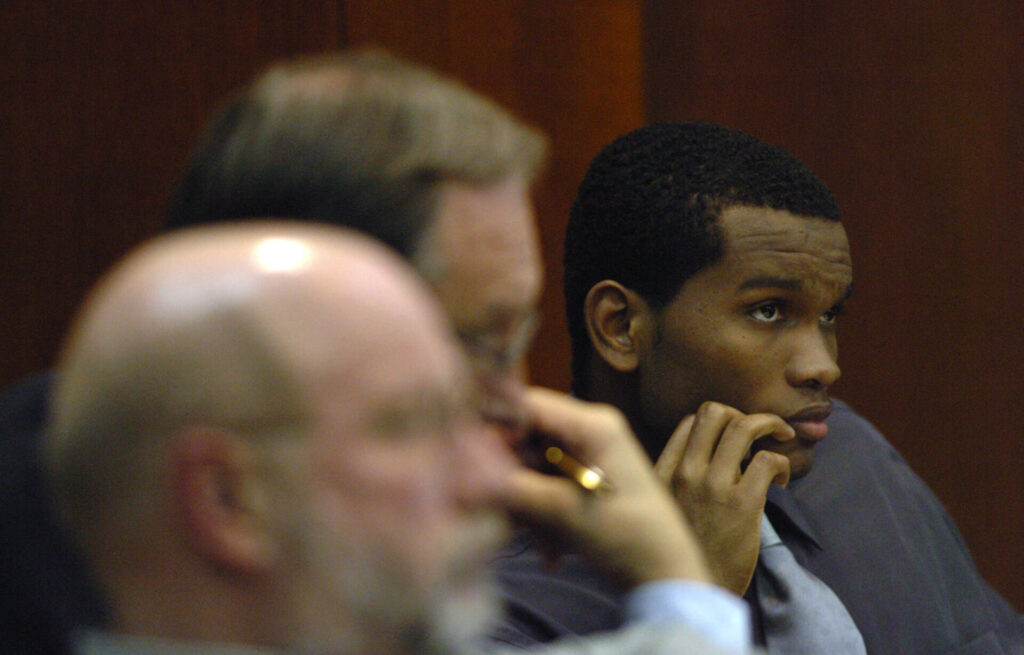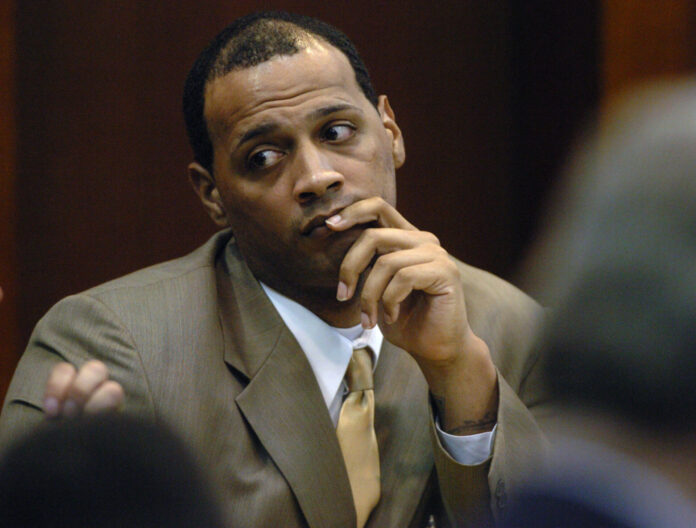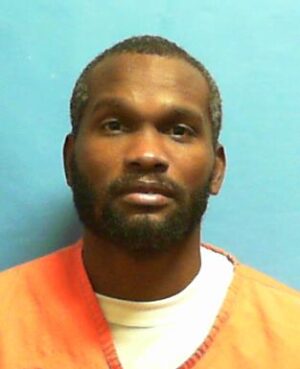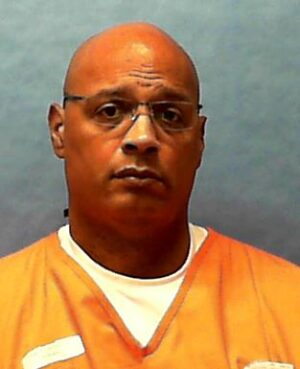A strange set of legal circumstances hangs over the case of convicted murderers Troy Victorino and Jerone Hunter, who are currently on death row pending a new sentencing hearing.
Victorino and Hunter were both found guilty in 2006 of six counts of first-degree murder for the killings known as the Deltona massacre or Xbox murders, a horrific revenge killing that left six people bludgeoned and stabbed to death and one dog trampled in a Deltona home. Two co-defendants, Robert Cannon and Michael Salas, were sentenced to life in prison.
Victorino and Hunter were both sentenced to death for four of the murders, and sentenced to life for two of the murders. In the death-sentence decisions, the jury members were not unanimous.

CONVICTED — Jerone Hunter at his trial in 2006
However, a 2016 ruling by the Florida Supreme Court in the case Hurst v. State (prompted by a 2014 ruling by the United States Supreme Court), found that death penalty jury verdicts must be unanimous. If the jury is non-unanimous, the sentence is then life in prison. The ruling in the case was the basis for a Florida law passed in 2017, and the death sentences of Victorino and Hunter were overturned by 7th Judicial Circuit Judge Randell Rowe III that same year.
The men will never leave state prison. They are still serving two life sentences for two of the murders, and they are still guilty of the other four murders. But under the 2017 death-penalty law, they must be sentenced again.
Again, the state is seeking the death penalty and, again, a jury must be formed to hear evidence and arguments. Again, a jury must decide whether the circumstances of the murders warrant death by lethal injection.
There are 299 inmates currently on death row in Florida, but the 2017 law benefits only those sentenced by non-unanimous juries from 2002 to 2014, or who had exhausted their appeals before 2002.
Of the 14 inmates convicted in Volusia County who tried for resentencing, five had the death penalty overturned, six had their appeals for resentencing denied, and three cases — including Victorino’s and Hunter’s — are still in progress.
Under the unusual circumstances, a new sentencing for Victorino and Hunter in the four murders has been lumbering forward through the 7th Circuit Court for nearly six years, as state prosecutors and defense attorneys have once again gathered evidence and medical experts.
As the new sentencing fast approaches — it is set for April 10 — a flurry of motions and countermotions have been filed; some 80-plus in the past few months.
In the meantime, however, the Florida Supreme Court, whose makeup dramatically changed in 2019 with the retirement of three moderate and liberal justices, has walked back the finding in Hurst v. State.
The court ruled in a 2020 decision in Poole v. State that a jury needs to be unanimous only in deciding whether a defendant is eligible for the death penalty, not in their ultimate recommendation of whether the inmate should be sentenced to death.
That ruling — and the 2022 jury decisions in the Marjory Stoneman Douglas High School shooting that prevented mass murderer Nikolas Cruz from receiving the death penalty because the jury was not unanimous — has prompted two bills filed in the current session of the Florida Legislature.
Senate Bill 450 and House Bill 555 will again allow for the death penalty to be imposed if the jury was not unanimous in its verdict. The bills are highly likely to pass in the Republican-led Legislature this year, and could take effect as early as July 1.
It is against this background that the new sentencing of Victorino and Hunter is scheduled — set in motion six years ago, and set to culminate in a new trial mere months before a state law could take effect that would, once again, allow them to be sentenced to death by a non-unanimous jury.
In a strange twist, the state had sought at a March 17 hearing to continue the trial to a later date, due to the sudden death of Dr. William Meadows, a psychologist who was hired as an expert witness on behalf of the state. Meadows passed away March 6.
The defense attorneys argued vigorously against the motion, not in the least because Victorino’s attorneys, Gonzalo Andux and Ann Finnell of Finnell, McGuinness, Nezami & Andux P.A., are in the process of ending their practice. Victorino then could potentially have lost his defense attorneys before the new trial.
“We are literally in a situation where we have to get this done,” defense attorney Andux told Judge Rowe at the hearing.
Citing a 2002 case, Judge Rowe found that continuing the case possibly past the time when a new death penalty law would be enacted would be unduly prejudiced against the defendants, beyond the prejudice inflicted on the state by the death of one of their expert witnesses.
“This could be delayed another couple of years. And justice delayed is justice denied,” Rowe said. “I can’t think of more undue prejudice than a change in law that makes it easier for the defendants to receive the death penalty.”
Rowe denied the state’s motion. The court will soon begin the process of jury selection ahead of the April 10 trial of Victorino and Hunter.
The sea of change in the wake of the 2016 Florida Supreme Court decision on the death penalty, the walking back by the court of the ruling, and the possible passage of new state laws this year will continue to have ripple effects on current and future death row cases.
Whether Victorino and Hunter will again be sentenced to death, however, will hang in the balance of the complete agreement of 12 Volusia County jurors.
In other states
Most states with the death penalty impose a life sentence if the jury is not unanimous in recommending execution.
States vary in their handling of non-unanimous decisions. Five states (Alabama, Arizona, California, Kentucky and Nevada) provide for the state to have another opportunity for the death penalty at a new sentencing hearing with a different jury. In Indiana and Missouri, juries that aren’t unanimous in recommending death are considered “hung juries” and the judge becomes the decision-maker.
In Montana, the judge sentences based on a jury finding of aggravating factors.
In Nebraska, a panel of judges decides the sentence, and if the panel is not unanimous, the sentence must be for life.
— A March 8 analysis of Florida Senate Bill 450
THE DEATH PENALTY BY THE NUMBERS
100
The number of people executed in Florida since 1976, when the death penalty was resumed in the state. The most recent person to be executed was Donald Dillbeck, who was convicted in 1991 and put to death Feb. 23, 2023. Dillbeck’s last words were a denouncement of Gov. Ron DeSantis, who signed Dillbeck’s death warrant.
22
States with an active death penalty
1
State that allows a judge to impose a death sentence based upon a non-unanimous jury vote (Alabama)
299
Current Florida death row inmates
30
Florida death row exonerations since 1976, the most of any state
34
Death row inmates who were resentenced to life in prison in the wake of 2017 Florida law
4
Death row inmates who were resentenced to death in the wake of 2017 Florida law
2
Death row inmates who were found not guilty during resentencings triggered by the 2017 Florida law


